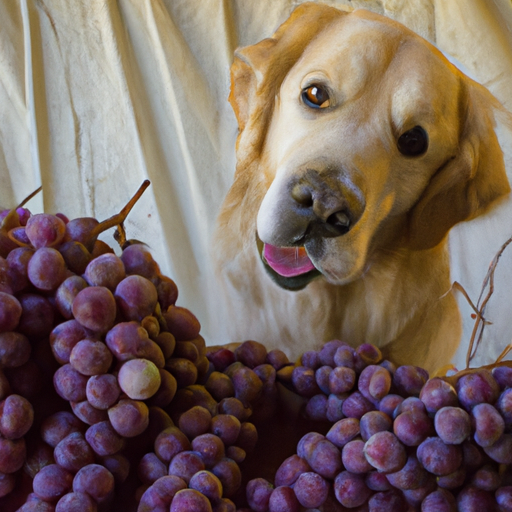There’s a common saying that you’ve likely heard before, “A dog is a man’s best friend.” As a dog owner, you understand the depth of this statement. You’re an integral part of your dog’s life, ensuring their happiness, health, and well-being. And a critical aspect of their health revolves around their diet. One question often raised by dog owners is the safety of feeding grapes to dogs. This article aims to provide a comprehensive answer to this question and delve into the reasons behind it.
Table of Contents
1. Understanding the Danger
2. The Science Behind Grape Toxicity
3. Symptoms of Grape Toxicity
4. What to Do If Your Dog Eats Grapes
5. Frequently Asked Questions
Key Takeaways
– Grapes are toxic to dogs and should never be fed to them.
– The exact substance causing toxicity in grapes is unknown.
– It’s vital to contact a veterinarian if your dog ingests grapes.
Understanding the Danger
As a dog owner, it’s crucial to know that grapes and grape products are toxic to dogs. The ingestion of grapes, whether raw, cooked, or in a processed form such as raisins, can lead to acute sudden kidney failure in dogs. This is a serious condition that can be potentially life-threatening. The exact cause of this toxicity is unknown, making it even more crucial to prevent your dog from eating grapes. PetMD provides an extensive guide on foods that are toxic to dogs, a useful resource for any pet owner.
The Science Behind Grape Toxicity
Although the exact substance causing toxicity in grapes is yet to be identified, studies have shown that the toxic component is present in all parts of the grape, including the seeds, flesh, and skin. The toxic effect also doesn’t seem to be related to the dog’s size, breed, or age. Even small amounts of grapes can cause severe illness or even death in some dogs, while others may ingest them without noticeable effects [^1^].
On OneTopDog, you can find more information on other foods dogs should avoid, helping you keep your furry friend safe and healthy.
Symptoms of Grape Toxicity
Knowing the signs of grape toxicity in dogs can help you act quickly and potentially save your pet’s life. Symptoms may occur within a few hours of ingestion and can include:
- Vomiting
- Diarrhea
- Lethargy
- Abdominal pain
- Decreased appetite
- Decreased urine production
If you notice any of these symptoms in your dog after they’ve consumed grapes, it’s essential to seek immediate veterinary care.
What to Do If Your Dog Eats Grapes
If you suspect your dog has eaten grapes, it’s crucial to act immediately. Here are some steps to follow:
- Do not induce vomiting without consulting a vet first. While it might seem like a logical step, it can sometimes do more harm than good.
- Contact your vet immediately. Even if your dog appears fine, don’t take any chances.
- Follow your vet’s instructions. They may instruct you to bring your dog in for treatment or to monitor them at home.
Keep in mind, the sooner your dog gets treatment, the better their chances of survival. OneTopDog has some valuable information on emergency care for dogs that could help you if you’re ever in such a situation.
Frequently Asked Questions
Why are grapes toxic to dogs?
The exact cause of grape toxicity in dogs is unknown. However, ingestion can lead to acute kidney failure.
What should I do if my dog eats grapes?
Contact your vet immediately. Do not induce vomiting unless instructed to do so by your vet.
Can some dogs eat grapes without getting sick?
While some dogs may not immediately show symptoms, feeding your dog grapes is not worth the risk, given the potential for severe illness or death.
Are any other fruits toxic to dogs?
Yes, several other fruits, like cherries and avocados, can be harmful to dogs. You can find a comprehensive list here.
In conclusion, as a caregiver to your pet, it’s crucial to be aware of the dangers some human foods can pose to them. When in doubt, always consult with a veterinarian or trusted pet health resource. Remember, it’s our responsibility to ensure the safety and well-being of our furry friends. The bond between you and your dog is special, let’s keep it that way!
[^1^]: The exact cause of grape toxicity in dogs is still unknown.



